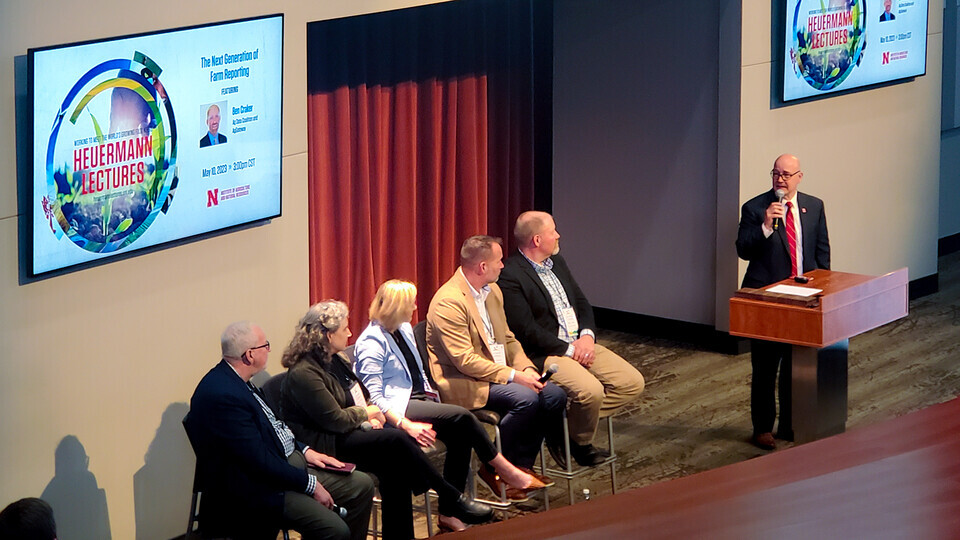
Lincoln, Neb. —How can American ag producers be helped to meet ever-more-detailed reporting obligations for field data? What can be done to give farmers confidence that data-sharing processes will treat them fairly? Are there entrepreneurial opportunities to make data handling more efficient for producers and provide them with financial incentives for data sharing?
A May 10 Heuermann Lecture and an accompanying panel of experts recently addressed those questions at the start of a three-day national conference at Nebraska Innovation Campus.
Producers are already familiar with reporting their ag data for crop insurance or farm payment purposes. But the future is likely to bring reporting obligations requiring far greater detail and complexity, said Heuermann lecturer Ben Craker, portfolio manager at the global nonprofit AgGateway and president of the Ag Data Coalition.
Barcode advancements and associated reporting requirements will enable traceability down to the field level. A growing number of producers are looking at possible eligibility for carbon credits. In both cases, Craker said, farmers will need to meet data-reporting requirements well beyond the current norm.
Craker’s nonprofit, AgGateway, works to help ag producers navigate the complex data-reporting environment. So does Alabama-based GreenPoint Ag Holdings, whose vice president of business innovation and agronomy, Amy Winstead, spoke on the conference’s ag-data panel.
Given the outreach capabilities of organizations like Nebraska Extension, program specialists could consider ways they might contribute as “concierge to all this new technology,” said Cynthia Parr, assistant chief data officer for the U.S. Department of Agriculture’s Research, Education and Economics Mission Area.
The speakers offered their analysis on the opening day of the inaugural conference of the National Agricultural Producers Data Cooperative. That initiative, funded by USDA’s National Institute of Food and Agriculture, is working to create a network of national ag data repositories, ending the disconnect that currently separates multiple, incompatible platforms.
A group of University of Nebraska–Lincoln faculty members is at the forefront of the effort, which involves a range of universities and stakeholder organizations. A key leader of the initiative, Jennifer L. Clarke, a professor of statistics and food science and technology who directs the university’s Quantitative Life Sciences Initiative, moderated the conference panel.
Data sharing can have particular value when the combining of data provides a “missing piece” that helps address a practical agricultural challenge, said Tom Eickhoff, chief science officer leading the science organization at Climate and digital farming at Bayer Crop Science. Eickhoff is a Husker alumnus, with a Bachelor of Science in agronomy and master’s and doctoral degrees in entomology.
Several speakers noted the room for new types of agricultural service providers as data sharing becomes more complex. One example is precision application, Eickhoff said.
Parr noted that airlines, plane manufacturers and the Federal Aviation Administration have worked constructively to share data in an effort to promote air safety. That approach could provide a general template for agriculture, she said.
One trust-building option, Craker said, would be for local farmers to adopt a cooperative-style approach, “putting them in the driver’s seat” of working collectively with entities higher up the supply chain. There also is the potential for startup companies to specialize in helping producers find value from sharing their ag data. “There should be some value coming back to the farmer for doing this,” Craker said. “That’s where I think a lot of the economic driver is.”
He had similar thoughts regarding reporting requirements for environmental sustainability. If “that farmer is going to go through all the effort to document what he’s doing, there’s got to be a premium on what he’s doing,” Craker said. “Otherwise, there is no incentive for them to do that.”
The relationships involved in ag data-sharing are like a chain, said Graham Plastow, professor of livestock genomics and CEO of Livestock Gentec at the University of Alberta. Just as oil enables a chain to function properly, he said, trust-building among all participants in an ag data network can prevent friction and promote constructive relationships to everyone’s benefit.
In addition to Clarke, Husker faculty members with key duties for the ag data initiative are Joe Luck, precision agriculture and biological systems engineering; Laura Thompson, ag extension and farm research; Matt Spangler, beef genetics; Scout Calvert, University Libraries; Hongfeng Yu, advanced cyberinfrastructure and high-performance computing; and Trenton Franz, hydrology and water management.







